By Jenuine Poetess
I love a good play on words. I love community arts and culture. I also love a good celebration. So without further ado…*drumroll please*
CONGRATULATIONS WACO ON RECEIVING A UNANIMOUS VOTE TO BE DESIGNATED AS STATE OF TEXAS CULTURAL DISTRICT!!!! WOOOOOHOOOOOOOOO!
While I catch my breath you might be thinking, “Whooooo! Yay! But honestly, what does that even mean?” Great question, I’m so glad you asked! According to the Texas Commission on the Arts (TCA), our state arts agency, Texas has a cultural district program that, “can designate special zones [cultural districts] that harness the power of cultural resources to stimulate economic development and community revitalization. These districts can become focal points for generating businesses, attracting tourists, stimulating cultural development and fostering civic pride.” TCA recognizes that, “A thriving creative sector is a powerful economic development asset. Cultural district development is one strategy that helps a community boost economies while realizing other cultural and civic benefits. The outcomes of cultural districts extend beyond the arts and benefit all members of a community.”
There are a number of ways this designation will help Waco as a community as well as provide support and needed platforms for artists who are living and creating in Waco to continue our work and cultivate sustainable livings as artists. If I haven’t already made it clear, this is a HUGE win for Waco Arts and I am so proud to have joined so many others in the efforts to 1) create and sustain community-centered, inclusive, arts programming in our community and 2) be involved in the two-year Cultural District application process–directed by Fiona Bond of Creative Waco (You can read more about Fiona’s work with Creative Waco in an interview blog I wrote last year). It takes a village my friends, and this is definitely a moment to savor and celebrate. Oh, and did I mention that Waco ranked TOP in the state out of all the cities applying for Cultural District designation this year? Yep. We did.
In many ways, our work is just beginning…and certainly our work is continuing.
Last week many artists participated in #WorldArtDropDay in which we distributed art works all throughout the city leaving them—with FREE ART tags—for people to find and enjoy. Participation in this global project was inspired by Central Texas Artist Collective and in preparation, CTAC hosted several open community #artjam sessions at local libraries where for several hours people of all ages and artists of all disciplines could gather and create in a collaborative space with others. CTAC had a wonderful turnout of 15-20 artists join us over the two sessions and based on the requests and feedback from community, CTAC will likely host regular community art jam spaces so stay tuned for all the details there (on their website and at Twitter, Instagram, and Facebook @CenTexArtists). CTAC continues to foster creativity with the ongoing #ArtAbandonment project and is gearing up for their community booth at the 2016 Waco Cultural Arts Fest. The artists at the CTAC booth this year will be Christy Town; Carlos Arias; Rhiannon Rosenbaum; Angie Veracruz; Steve Veracruz; Jenuine Artworks; and When Brothers Draw.
Coming up this week, Waco celebrates the grand opening of the brand new Waco Hispanic Museum–a collection of arts and cultural artifacts honoring the rich Latinx history and community thriving in Waco today. The kick-off begins this Friday September 16th from 2:30-5:30pm with programming for all ages. On Saturday the festivities begin at 10am and go until 2:30pm. Located at the South Waco Community Center at 2815 Speight, this event is FREE and donations are appreciated. In addition to the museum exhibit, there will be performances, Gritos de Dolores, and a voter registration booth. For more information contact: [email protected]; 254-548-9730.
On Sunday September 25th from 4-8pm the Waco Hippodrome and Waco Poets Society presents Peace on the Patio a community open mic as part of the global project, 100Thousand Artists for Change. This year marks the fifth year Waco Poets Society has organized this event for our community. We are so grateful to our generous sponsoring venue, Waco Hippodrome for opening their patio to us for this event. Beginning at 4pm Ninth Limb Yoga, LLC will be  providing Yoga Fore Change Project yoga session ($5 suggested donation) until 5pm at which point the open mic, featuring singer/song writer, Katie Stewart, will begin. This year’s theme is Peace, Justice, Sustainability, and Love–so bring your songs, poems, stories, spoken-word pieces; bring your family, your friends, your neighbors, and co-workers. Purchase some delicious food and specialty drinks as a way of saying thank you and supporting a local business who gives back so faithfully to our community! Contact: [email protected].
providing Yoga Fore Change Project yoga session ($5 suggested donation) until 5pm at which point the open mic, featuring singer/song writer, Katie Stewart, will begin. This year’s theme is Peace, Justice, Sustainability, and Love–so bring your songs, poems, stories, spoken-word pieces; bring your family, your friends, your neighbors, and co-workers. Purchase some delicious food and specialty drinks as a way of saying thank you and supporting a local business who gives back so faithfully to our community! Contact: [email protected].
The 2016 WCAF, taking place in Indian Spring Park and the Waco Convention Center September 30th-October 2nd, looks to be a delightful array of music, visual art, dance and performance, poetry and writing, African film, and science for all ages. In addition to performances and interactive exhibits, art stations, and experiments, the festival draws a tasty selection of food vendors, vibrant artisan vendors, and authors from across Texas and beyond. (For complete schedules and full details on each festival please visit the links above).
This week a new exhibit opens at the Art Center of Waco and will be available for viewing now through October 22nd. While I Breathe, I Hope is a collection of abstract paintings by Caroline Lewis. Also at the Art Center are a number of classes open to community participants and weekly Cookies and Coloring sessions on Friday afternoons. Plan ahead and mark your calendars for the annual Fall Festival and Pumpkin Art Auction on October 29th—the theme for this year is Superheroes!
This post marks the two-year anniversary of me writing this monthly Arts and Culture blog, in honor of milestone, I’m starting a new hashtag…but more than a hashtag, I want to propel movement that has already been stirring in our community. Are you ready? Are you curious? Remember when I told you I love a good play on words? Well, here we go: #ArtLocallyWaco. 🙂 It seemed a completely natural conclusion especially when so many of us art (as a very active verb) locally, here in Waco.
If I’ve learned anything over the past 4+ years I have been creating and organizing arts programming in Central Texas, it is that showing up to the page, the canvas, the camera lens, the stage, the microphone, the textiles, the music, the wall, the materials—whatever they may be, the community is the single most important practice to have as an artist. Sure raw talent and honed skills are valuable. But what is vital for a thriving, creatively sustainable community, is at the very core so simple: it is we, showing up.
Sometimes that means to exhibit or perform, sometimes that means to set up and break down, sometimes that means lending a window or a wall as exhibit space, sometimes that means opening up your business as a performance or event venue, sometimes that means liking and sharing events on social media, sometimes that means our bodies physically showing up to be present, sometimes that means donating dollars to help financially sustain these powerfully effective community grassroots efforts doing remarkable good throughout our community, sometimes it is investing in local artists and writers buying their creations and books, sometimes it is advocating at city council or at the capitol or at the school board to ensure that funding and policy continues to make room for and protect the arts. What I love about community-centered arts and cultural programming is that there is room for every person of every age, every skill-level, every talent, every strength, every expression, every style, every medium.
So I put this challenge out to you—how will you #ArtLocallyWaco this month and beyond? Post in a comment, send us an email: [email protected], or tag us in your own social media post about how you will get or stay involved in the arts in Waco. I’m proud of what we are creating here in Waco, it is an ever-evolving, community collaboration and such a magnificent work of art!
 Jenuine Poetess is an artist, visionary, and community organizer. In 2010, she founded In the Words of Womyn (ITWOW), an international, grass-roots, written and spoken-word arts project with chapters throughout Los Angeles, CA; Waco, TX; and Lebanon. Jenuine is the founder of Waco Poets Society and co-founder of the Central Texas Artist Collective. She writes, organizes, and creates rooted in the fierce conviction that holding intentional space, access, and opportunity for all people to foster their creative health is a matter of justice and is a vital asset to the sustainable thriving of communities. She currently lives and poems in Central Texas where she enjoys finding new ways to disrupt the homeostasis of her city. You can contact her at: j[email protected].
Jenuine Poetess is an artist, visionary, and community organizer. In 2010, she founded In the Words of Womyn (ITWOW), an international, grass-roots, written and spoken-word arts project with chapters throughout Los Angeles, CA; Waco, TX; and Lebanon. Jenuine is the founder of Waco Poets Society and co-founder of the Central Texas Artist Collective. She writes, organizes, and creates rooted in the fierce conviction that holding intentional space, access, and opportunity for all people to foster their creative health is a matter of justice and is a vital asset to the sustainable thriving of communities. She currently lives and poems in Central Texas where she enjoys finding new ways to disrupt the homeostasis of her city. You can contact her at: j[email protected].
The Act Locally Waco blog publishes posts with a connection to these aspirations for Waco. If you are interested in writing for the Act Locally Waco Blog, please email [email protected] for more information.
By Rolando Rodriguez Soto
(This post is part of an on-going series about Downtown Waco. In a sense, Downtown is “everybody’s neighborhood.” In this series of blog posts we hope to contribute to the on-going conversation in Waco about what it takes to have a great downtown, and what we want for our own “Wacotown.” To see all the posts in this series, click here: Downtown Waco. – ABT)
When you hear the word “downtown,” what image pops into your head? Is it a successful commercial district complete with subways and skyscrapers? Is it a quaint collection of historic buildings and antique stores? Is it a thriving strip of restaurants, trendy shops and live music venues? Maybe the word “downtown” makes you think of concert halls, culture, and nice department stores? Or maybe the image in your mind is negative, one of boarded up buildings, graffiti, and crime.
More to the point for the purposes of this blog series, what image pops to mind when you think of Waco’s downtown? What do you like? What would you like to see? What would you like to see go away? How do we even get our minds around what we want in a downtown when there are so many possibilities?
Maybe one way to think about it is to try to come up with a list of the typical elements that make up a downtown and to think about where Waco is and where we want to be in respect to those elements. You may have your own list of elements in mind…here are a few of mine:
Residential
Imagine waking up on a Monday morning and looking out your window to see storefronts, busy sidewalks and the ALICO building. After getting ready for the day, you go down a few flights of stairs, go next door to your favorite coffee shop to get your fix and then you walk a few more blocks to the office to start your work day.
Waco offers Some unique possibilities when it comes to downtown living. Luxurious lofts, historic buildings and apartments overlooking the Brazos river are just a few of the options.
The former Waco High School campus on Washington Ave. and the former Waco Independent School District alternative school campus were recently transformed into loft apartments that still retain the historic look. You can still find lockers and white boards in the Waco High Lofts building to remind residents of the building’s life in the 20th century.
The redefined downtown residential life is perfect for college students, young professionals, and empty-nesters who are eager to take advantage of a new form of living, which will breathe life into downtown.
Commercial
Business is another crucial element of a thriving downtown. In previous years, many major department stores and restaurants began moving away from downtown to be near highways or in malls. This unfortunately left downtown with deteriorating and empty storefronts, which did not exactly make living in downtown desirable.
Recently, new businesses have begun to reassess the value of a downtown. Waco currently offers restaurants, coffee shops, office space, boutiques and antique shops in its downtown space.
As we continue to expand and add more commercial opportunities, Waco will be able to generate more employment and tax revenue prospects, which will attract new residents and creative thinkers.
Amenities
So far, you have enjoyed your relaxing apartment, your walk to work and some fun shops and restaurants in between, but now after a long day in the office, you want to go out and do something fun. A strong downtown environment should be able to offer nightlife, culture, recreational activities and community events, so that there is a reason stay in the center city.
Events or activities such as a farmer’s market, art festival, concert, block party, weekly or monthly events or a special movie screening all contribute to a fun environment where residents can expect to find one central location that features work and play.
These types of events and activities are almost expected in downtown environment. Fortunately, Waco also offers unique amenities you most likely won’t find anywhere else such as the Magnolia Market at the Silos, the Waco Hippodrome Theatre, Balcones Distillery or the Art on Elm Festival.
In a commercial district where buildings and streets take charge, it is important to recognize and appreciate nature. Fortunately, any street in downtown can lead you to the beautiful Brazos River, Indian Spring Park featuring the Suspension Bridge, or Cameron Park with its hiking trails and Cameron Park Zoo.
Transportation
We have defined the three major elements that reflect daily life—relaxation, work and play. Now how do we connect the dots?
A major benefit of a centralized downtown location is walkability. Not only do residents have the benefit of walking from home to work or other stores, restaurants or events, but also they benefit the environment by reducing their carbon footprint.
Exploring everything downtown has to offer is more enjoyable on foot because you are able to appreciate each store front and historical piece at a slower pace.
In its current state, downtown does not have the most traversable streets and sidewalks, but the city of Waco has improved over the years through the addition of bike lanes, larger sidewalks and shuttle services.
Streets in Waco may seem simple to someone who has lived here all of their life, but to anyone else, the streets can be confusing with their oddly timed traffic lights and one way streets.
Technology is beginning to help make navigating downtown easier. We can access bus routes and directions with our navigation apps on our phones, and we can even call a car service with another app. But, creating a pedestrian friendly environment is crucial to establishing a welcoming downtown where a Wacoan can walk from their loft to work, their favorite coffee shop, the movie theatre or the park.
Have we fully realized the potential for downtown Waco? I hope not. I hope to see downtown continue to grow and thrive. Who knows? Maybe one day we will even have more than one skyscraper!
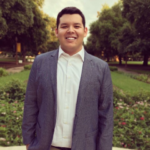 Rolando Rodriguez Soto was raised in Waco, TX, and he is currently attending Baylor University with plans to graduate in December 2016 with a Bachelor of Arts in Professional Writing & Rhetoric. After graduation, he hopes to work in Waco in the nonprofit sector to help realize the full potential of Waco. His long term goals include hopefully creating and publishing creative work whether that is a novel, short story or even a television show.
Rolando Rodriguez Soto was raised in Waco, TX, and he is currently attending Baylor University with plans to graduate in December 2016 with a Bachelor of Arts in Professional Writing & Rhetoric. After graduation, he hopes to work in Waco in the nonprofit sector to help realize the full potential of Waco. His long term goals include hopefully creating and publishing creative work whether that is a novel, short story or even a television show.
The Act Locally Waco blog publishes posts with a connection to these Aspirations for Waco. If you are interested in writing for the Act Locally Waco Blog, please email [email protected] for more information.
(Act Locally Waco loves Waco area entrepreneurs! For more posts about local entrepreneurs, please click here: Entrepreneurs of Waco. If you would like to nominate a Waco entrepreneur to be profiled, please email [email protected]. – ABT)
By Penni Litzau
“In my work as a business advisor for the Small Business Development Center I enjoy working with all types of small business owners every day. From time to time I run across a true craftsman/craftswoman and the business is only necessary to provide the framework for them to share their craft with the world. Penni is one of those craftswomen.” – Tim Holtkamp, Business Advisor, McLennan Small Business Development Center
Hello, I’d like to introduce myself! My name is Penni Litzau, and, many years ago, I fell into a love affair with the art of custom framing. I first became acquainted with custom framing in the mid-80’s, and it opened up a whole new world for me. I had never even heard of custom framing, didn’t know what it was. As far as I knew, people just bought pictures and they were already framed in some magical way.
Up until that time, my sum total of work experience had been in daycare and fast food. Even though I enjoyed working with customers and the direct contact with the public, I had become less than excited about things like inordinate amounts of grease, and I remember coming home feeling covered in it.
So, I began the hunt for a new job. I knew I was intrigued by the world of retail, and that became my new emphasis. I remember applying for a wide variety of jobs—everything from selling candles to high-end clothing sales. Then, I saw an ad at the employment commission for seasonal work at Old America in Clute, Texas.
When I submitted my application for the job, I was asked if I knew how to read a tape measure. I said I could, and after a few successful tries at measuring an assortment of objects, the job was mine. Though I didn’t know it at the time, this “seasonal” work would grow into full time.
From that point on, I was hooked. I was amazed at how many different directions you could follow to create a piece of art. I was mesmerized by the entire process—from working with each individual object and using my own imagination to presenting every new customer with a final product that was displayed for them in the best way possible. I was giving something precious—a memory, a photo, handmade artwork, sometimes even a shadow box—that could be enjoyed for years to come.
In my very first encounter with the art of custom framing, I questioned the customer as to what thoughts they had and what direction they wanted to go with their print. I was not prepared for the response. “Well, you’re the expert; why don’t you tell me?” My initial thought was that they were my first customer and I wasn’t sure I would be able to give them what they expected.
Right then and there, I made a decision. I figured if I acted like I’d been doing this for years, it would create a level of trust in me. And, boy, did I want this to work, both for them and for myself. I took the work in hand and prayed that I would be successful in making them happy and in creating something special.
Happily, my first run at it turned out to be exactly what they were looking for. It was a wonderful experience for them and for me. From then on, I knew that, somehow, I had an innate understanding of what it took to create something like this. Most importantly, it was something I could be proud of.
In the end, I had to give up that job because I had to move away. There followed a succession of years in which I had to leave my new-found love for a time and work once again in fast food. I had to pay my bills, and at that time, framing only paid minimum wage, regardless of one’s level of expertise.
In all affairs of the heart, there are many twists and turns before the happy ending, and mine was no different. I explored numerous other paths, seeking education and better pay. I made a move to Waco, Texas, to be closer to my family. Eventually, I married, and my husband, Stephen, and I began a blended family.
After working several years pursuing a potential career in electronics, I found I was still unhappy due to the lack of artistic expression. My husband and I decided that I would leave work for a period of time and spend more time with our growing family. Later, after the kids went back to school, I returned to the work field.
Throughout the years, I had longed to return to framing, so I applied to the two chain stores with frame shops in Waco, Michaels and Hobby Lobby. Miraculously, when I walked into Hobby Lobby and told them I had a background in framing, they told me there was a position needing to be filled in their frame shop. I got hired on the spot!
For the next sixteen years, I worked in framing, and, finally, realized it had become my passion. After all these years, I found myself not only loving what I was doing but slowly progressing to a better living wage. Beyond all doubt, framing was the perfect career I wanted to pursue.
So now, the time has come to end one story and begin the next. It is an exhilarating, almost breathtaking experience to start my own business doing what I love the most. But, you know what they say, “If you do what you love, and you will never work a day in your life.”
I’m looking forward to this new, next journey—that of helping people preserve their special artwork, personal memories and experiences in the best way possible. Through the use of specialized framing techniques and artistic expression, I know I can make your next memory one that will last you a lifetime.
Penni Wise Custom Framing is located at 7033 Sanger Avenue in Waco, Texas, right on the access road of Highway 6. My hours of operation will be Tuesday through Friday 9:30 AM to 5:30 PM and Saturday 10:00 AM to 2 PM. I will be open the first week in September with an official Grand Opening October 1st, 2016. Please come and visit. I would love to meet you and together create a thing of beauty.
 Penni Coleman Litzau was born in San Antonio, Texas and has spent the majority of her life in Texas. She attributes, in part, her eye for detail to being raised by a mother who lost her eyesight due to Multiple Sclerosis. Penni became her “mother’s eyes” and described everything she saw in great detail and vivid color. In 1996, she moved to Waco, Texas to be closer to her mother, sister, and family. A year later, Penni met her husband Stephen Litzau, the Millwork Supervisor and longtime master craftsman for CM Trautschold. They blended their family in 1998. You can contact Penni through email at [email protected] , www.penniwisecustomframes.com , or facebook.
Penni Coleman Litzau was born in San Antonio, Texas and has spent the majority of her life in Texas. She attributes, in part, her eye for detail to being raised by a mother who lost her eyesight due to Multiple Sclerosis. Penni became her “mother’s eyes” and described everything she saw in great detail and vivid color. In 1996, she moved to Waco, Texas to be closer to her mother, sister, and family. A year later, Penni met her husband Stephen Litzau, the Millwork Supervisor and longtime master craftsman for CM Trautschold. They blended their family in 1998. You can contact Penni through email at [email protected] , www.penniwisecustomframes.com , or facebook.
By Hannah Parrish
 This summer, I planned, implemented, and evaluated a five-week worksite wellness program called BEAT THE HEAT for the staff of the Waco-McLennan County Public Health District (WMCPHD). I am graduating from Baylor University this August with my bachelor’s degree in Public Health. As a part of my summer internship, I was given the opportunity to connect my studies to public health practice. My experience with BEAT THE HEAT has allowed me to grow in my understanding of public health in many ways, but it has specifically taught me the importance of worksite wellness programs.
This summer, I planned, implemented, and evaluated a five-week worksite wellness program called BEAT THE HEAT for the staff of the Waco-McLennan County Public Health District (WMCPHD). I am graduating from Baylor University this August with my bachelor’s degree in Public Health. As a part of my summer internship, I was given the opportunity to connect my studies to public health practice. My experience with BEAT THE HEAT has allowed me to grow in my understanding of public health in many ways, but it has specifically taught me the importance of worksite wellness programs.
According to The Centers for Disease Control and Prevention (CDC), worksite wellness programs can help “maintain and improve the health of employees,” and they can also reduce the employees’ risk of developing “costly chronic diseases” (WH 101 Resource Manual). According to the Worksite Health 101 Resource Manual developed in partnership by Viridian Health Management LLC and the CDC in 2016, a healthier workforce can lead to “lower direct costs such as insurance premiums and workers’ compensation claims,” and it can also “positively impact many indirect costs such as absenteeism and worker productivity” (WH 101 Resource Manual).
The worksite wellness program, BEAT THE HEAT, was designed with the mission to equip the employees of the WMCPHD with the tools and resources necessary to promote total wellness in their daily lives. On a broader scale, BEAT THE HEAT offered accountability, motivation, and education to the staff of the WMCPHD in an effort to instill long-term practices of wellness. BEAT THE HEAT carried out these missions through a period of five-weeks, and the program included motivational, educational, and accountability components. The program allowed the employees of the WMCPHD to focus on several dimensions of wellness, and encouraged them to make daily choices that would “add up.” The employees were provided weekly activity logs, and each activity focused on a different dimension of wellness. A certain number of points were designated to each activity on the log, and the activity logs changed week to week. By the end of the five-week program, the top five individuals with the most points earned chose their prizes.
I partnered with local businesses, The Mix Café, Oh My Juice!, and D1 Sports Training, to ensure that nutritionally and physically healthy prizes were offered to program participants as incentives. BEAT THE HEAT was marketed through the use of informational and motivational flyers, which were administered to the staff of the WMCPHD to generate interest. About half of the WMCPHD participated in the program, which doubled my initial goal of reaching twenty participants. Here’s what a few participants had to say about the program:
“This program encouraged me to add different wellness activities into my daily health regimen…activities that I would not normally participate in on my own.” – Janet Jones
“I have definitely gained a lot from the past 5 weeks, even though I consider myself a pretty healthy person to begin with. This program has been great because everyone can gain something from it. BEAT THE HEAT made me more intentional about some aspects of wellness that often get overlooked, such as getting enough sleep and drinking enough water. Knowing that you’re going to have to submit your points at the end of the week is a great motivator. I would start trying to talk myself out of a workout and then remember – I need those points!” – Katy Stone
My experience with the BEAT THE HEAT wellness program has taught me the importance of planning, implementing, and evaluating wellness programs in every workplace. I learned that wellness is only truly achieved when every dimension is viewed as an impacting factor. In 2015, about 70% of employers in the United States offered a “general wellness program” in their workplace (Forbes). While this estimation is higher than I predicted, there is always room for growth in the areas of specificity and goals of these programs. Does your worksite incorporate a monthly, quarterly, or yearly wellness program? If not, now is the time to start. Many worksites have a wellness coordinator to create wellness programs for employees. If you are interested in some ideas for wellness programs, the DSHS has compiled a list here. Many worksite wellness programs focus on physical and nutritional wellness; I decided to include every dimension of wellness in BEAT THE HEAT because every factor is important and contributes to our total wellness.
Finally, through my experience, I learned that creativity is key, and each person is different in their interests; these realizations made for a diverse program. I thoroughly enjoyed planning, implementing, and evaluating the BEAT THE HEAT wellness program for the staff of the Waco-McLennan County Public Health District!
 Hannah Parrish moved to Waco in August 2013 to attend Baylor University. She received her degree in Public Health from Baylor in three years, and had the opportunity to intern at the Waco-McLennan County Public Health District during her final summer in Waco. She loves traveling, fitness, community, coffee, and reading. She hopes to spend the next year teaching English overseas, and subsequently attend nursing school.
Hannah Parrish moved to Waco in August 2013 to attend Baylor University. She received her degree in Public Health from Baylor in three years, and had the opportunity to intern at the Waco-McLennan County Public Health District during her final summer in Waco. She loves traveling, fitness, community, coffee, and reading. She hopes to spend the next year teaching English overseas, and subsequently attend nursing school.
The Act Locally Waco blog publishes posts with a connection to these Aspirations for Waco. If you are interested in writing for the Act Locally Waco Blog, please email [email protected] for more information.
By Liz Ligawa
For a long time, I adhered to a belief system which denied a connection between personal experiences and collective realities. The individualism in which my upbringing was brined did not fully prepare me to dignify the personal realities of others. I filed the stories of others as exceptions to the truths I already held…well, that was until I began to realize how much the stories I dismissed shared similar characteristics, outcomes, properties, etc. So, I began to wonder, “Could my estimations be wrong?” Thankfully, my novice perspectives were challenged, and I grew to appreciate how the truth of individual experience sheds light on systemic or, collective realities. It is a good thing this transformation occurred before I found myself in social work as a community practitioner.
So, here I am. I joined the Prosper Waco team as the Director of Community Engagement on August 1st, and I am grateful for the strong ways my theological, and social work training prepared me to understand, and affect change in systems which can function to oppress, or marginalize- even when those are not the intended consequences. If you cannot tell, advocacy is my strong suit.
By now, you might be wondering: “What does this post have to do with its title?” Well, it is a little embarrassing to admit, but even with one month at the organization under my belt, the hardest question for me to answer is still, “What is Prosper Waco?” Now, now…before you encourage my boss to consider replacing me with someone else with greater acumen, let me just say, this is not an easy question to answer. Ask my boss.
One of the reasons I think I have had a hard time putting Prosper Waco into a more familiar context (even for myself) is that it is an organization which has philanthropic roots, but colloquial branches. Let me explain what I mean. Philanthropy, or its Greek beginnings, φιλανθρώπως, adds up to acting humanely, kindly, or promoting the welfare of others. Although the activities of Prosper Waco are philanthropic in the sense that they are driven to promote others’ welfare, the initiative does not fit a popular interpretation of philanthropy- one that has a monetary expression of benevolence. Instead, it operates, philanthropically, through collaboration among structures (organizations, companies, institutions, etc.) which already exist, and are familiar to the local community.
So, what does this have to do with the innkeeper? Well, in the parable of the Good Samaritan, there seems to be just one hero; or we think of the parable with our focus narrowed to just one helpful way to respond. But do we limit the good we can do by only filling the role of the Samaritan? In saying that, I realize there are several layers to this story. There are strong themes to be mined about the culture, biases, and social context- but that’s a study for another time. What I am curious about, however, is how our view of this narrative shapes, and informs our perspective on altruism. Do narratives like the Good Samaritan encourage altruistic behavior? I am not yet convinced.
Personally, I feel that the parable is more of a “calling out” than it is a “calling to”, but I also cannot ignore its utility in the conversations around who receives our help. However, what I think is important to pay attention to is the emphasis, and in my opinion, over-emphasis on individual efforts towards help. I wonder if we are less-likely to help if we feel like we are the only ones that can help. And if we approach helping others with the idea that it is all up to our individual efforts, how does that influence our interactions with our neighbor, and what do we miss by not seeing how others are also helping?
What I see when I look at this parable is philanthropy administered through collaboration, trust, relationship, and hope. I see collaboration because after the Samaritan placed the man on his donkey, he did not take him home. He took him to the inn. I see trust because when the Samaritan arrived at the inn, he did not stay with the dying man, but he entrusted him to the care of the Innkeeper. I see relationship because the Samaritan informed the Innkeeper that he would pay for additional costs on his return, and the Innkeeper agreed. I see hope because the Samaritan and the Innkeeper had to feel that their combined efforts would make a difference in the life they had encountered.
Promoting the welfare of others takes this type of attention…collaboration, trust, relationship, and hope. The dying man received help from what was already existing. We have a full cast of characters in our community. We have the wounded. We have those who tend to help in individual ways; but since they become easily overwhelmed with work that requires partnership, they go the other way if they can’t accomplish it alone. Most importantly, though, we also have those who are interested in what good we can to together. No, we do not adhere to the single story of the Samaritan being the only hero. We gladly accept the role of the Innkeeper.
 Elizabeth Ligawa is a recent graduate from Truett Theological Seminary, and the Diana R. Garland School of Social Work, earning both her Master of Divinity, and Master of Social Work. Though her prized role is being a mother to her dear son, Elijah, Liz has a love for encouraging people to come together in ways that engender healthy communities. Her role as the Director of Community Engagement at Prosper Waco allows her the room to work in and among the many faces of her beloved Waco community. She may be reached at [email protected].
Elizabeth Ligawa is a recent graduate from Truett Theological Seminary, and the Diana R. Garland School of Social Work, earning both her Master of Divinity, and Master of Social Work. Though her prized role is being a mother to her dear son, Elijah, Liz has a love for encouraging people to come together in ways that engender healthy communities. Her role as the Director of Community Engagement at Prosper Waco allows her the room to work in and among the many faces of her beloved Waco community. She may be reached at [email protected].
The Act Locally Waco blog publishes posts with a connection to these Aspirations for Waco. If you are interested in writing for the Act Locally Waco Blog, please email [email protected] for more information.
by Jennifer Alumbaugh, LMFT
I’ve had the honor of reading an advance copy of Healing from Hidden Abuse by Shannon Thomas, LCSW in exchange for my feedback and honest review. Even before this book came out, I have been impressed with the integrity of Thomas’ reflections on psychological, emotional, and spiritual abuse from both the theological and the psychological standpoint. As a Licensed Marriage and Family Therapist with a degree in Theology and a personal history in a number of church communities, it is not often I encounter material that resonates with such unapologetic and unfaltering truth. Thomas’ Healing from Hidden Abuse is one such book.
 Healing from Hidden Abuse is organized into several parts: introduction with background on the 2016 research project, “Examining Patterns of Psychological Abuse;” moving into the Basics of Psychological Abuse—a kind of 101 primer for anyone previously unfamiliar; the Six Stages of Recovery: Despair, Education, Awakening, Boundaries, Restoration, Maintenance; an address to family and friends of survivors; a resource section including a bibliography; and a collection of personal reflection and journal prompts to move the reader through their own process or to facilitate group process.
Healing from Hidden Abuse is organized into several parts: introduction with background on the 2016 research project, “Examining Patterns of Psychological Abuse;” moving into the Basics of Psychological Abuse—a kind of 101 primer for anyone previously unfamiliar; the Six Stages of Recovery: Despair, Education, Awakening, Boundaries, Restoration, Maintenance; an address to family and friends of survivors; a resource section including a bibliography; and a collection of personal reflection and journal prompts to move the reader through their own process or to facilitate group process.
In both my personal healing process and my professional clinical work with clients, when I consider materials to use or recommend, I look for several things:
Does the material have substance? I tend to shy away from materials that are too geared toward the beginner in self-awareness. I want something that is accessible to both the novice and the seasoned professional. I look for content that will inform, challenge, and inspire me.
Is the information clinically sound? Is there research and data that backs up the claims the author is making? Does the author have personal and/or professional experience in the field? —I want to be able to trust the author. I also evaluate whether or not the content holds water when I consider my own research, education, training, and clinical experience.
Is it clinically substantial while at the same time accessible to laypeople who are not mental health professionals and who may not be as familiar with the language of the profession? I want to use material that can connect with people who are engaging from a variety of professions, education levels, and experiences.
Is the language inclusive and intersectional? Is there an over-all cultural competence across a variety of identities? Especially in this time, I keep a look out for material that is gender and identity inclusive and retains minimal to no assumptions about identity and relationships.
Is there any bias in the content—skewed toward one experience over another—rather than encompassing the broad range of possible experiences?
 I’m pleased to report that Thomas’ work meets or exceeds my criteria, for the most part. While there is attention to dispelling the myths about abusers being only certain genders, there is a use of binary gender terms.
I’m pleased to report that Thomas’ work meets or exceeds my criteria, for the most part. While there is attention to dispelling the myths about abusers being only certain genders, there is a use of binary gender terms.
This book is deeply relevant and meaningful to anyone who has survived psychological and spiritual abuse from parents, pastors, partners, co-workers, friends, and others in their community. Beyond my resounding recommendation of this book to anyone who has or is surviving “Hidden Abuse,” I recommend it to anyone who loves, supports, is friends with a survivor. The education and insight available in this book is valuable to anyone striving to cultivate healthy, authentic, and loving relationships free from toxic dynamics.
In addition to being a mental health professional who supports others in their healing and recovery process, I have personally experienced psychological and spiritual abuse and continue to do the work of maintaining my recovery. It is these experiences especially which have motivated and inspired me to enrich my education and training in this specific area in order to be able to serve clients in need of this particular healing work. I center my own work as well as the process through which I guide my clients, in love and truth. What comes under attack with psychological and spiritual abuse is the truth, and learning to trust one’s self, one’s own intuition, and even one’s own spiritual experience is a core component in the healing process. Many survivors of psychological abuse have had the profoundly invalidating experience of not being believed when they reach out to others for help. If you receive nothing else from this blog post, I hope it is this truth:
I believe you. You matter. Your experiences, your pain, your grief, is real. There is a way out of despair. You don’t have to suffer alone or in silence. You are worthy of Love. You deserve to live a thriving life, as your whole and authentic self.
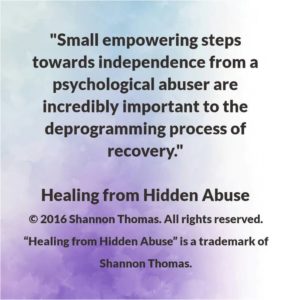 I will be using this text in my practice with clients individually, as a group facilitator, and as a professional development consultant providing trainings to various community agencies—police departments, domestic violence programs and shelters, and other mental and social service organizations. If you have had or think you may have had an experience with psychological or spiritual abuse and would like some support in sorting through the recovery process, or if you are connected to an agency interested in a professional development training on psychological abuse, please contact me through the Enrichment Contact Us page.
I will be using this text in my practice with clients individually, as a group facilitator, and as a professional development consultant providing trainings to various community agencies—police departments, domestic violence programs and shelters, and other mental and social service organizations. If you have had or think you may have had an experience with psychological or spiritual abuse and would like some support in sorting through the recovery process, or if you are connected to an agency interested in a professional development training on psychological abuse, please contact me through the Enrichment Contact Us page.
 Jennifer Alumbaugh, MS is a Licensed Marriage and Family Therapist providing clinical and professional development consultation services at Enrichment Training and Counseling Solutions. She has extensive experience working with adolescent and adult survivors of psychological and spiritual abuse, trauma (sexual violence, childhood trauma, interpersonal violence); and complex PTSD. These, along with grief and loss work are her areas of specialization. Jennifer practiced as a mental health clinician throughout Los Angeles County working with children, youth, and their families from 2007-2012. In Central Texas, Jennifer has worked as a Site Coordinator with Communities in Schools of The Heart of Texas at G.W. Carver Middle School; as an independent consultant and professional development trainer; and conference speaker. In 2016 Jennifer created an implemented a therapeutic creative writing program, Brave Young Voices, at Klaras Center for Families and at the Texas Juvenile Justice Department correctional campus at Mart, TX. She may be reached at: [email protected] or 254-405-2496.
Jennifer Alumbaugh, MS is a Licensed Marriage and Family Therapist providing clinical and professional development consultation services at Enrichment Training and Counseling Solutions. She has extensive experience working with adolescent and adult survivors of psychological and spiritual abuse, trauma (sexual violence, childhood trauma, interpersonal violence); and complex PTSD. These, along with grief and loss work are her areas of specialization. Jennifer practiced as a mental health clinician throughout Los Angeles County working with children, youth, and their families from 2007-2012. In Central Texas, Jennifer has worked as a Site Coordinator with Communities in Schools of The Heart of Texas at G.W. Carver Middle School; as an independent consultant and professional development trainer; and conference speaker. In 2016 Jennifer created an implemented a therapeutic creative writing program, Brave Young Voices, at Klaras Center for Families and at the Texas Juvenile Justice Department correctional campus at Mart, TX. She may be reached at: [email protected] or 254-405-2496.
The Act Locally Waco blog publishes posts with a connection to these Aspirations for Waco. If you are interested in writing for the Act Locally Waco Blog, please email [email protected] for more information.
By Harper Hoover
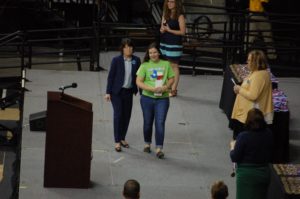 Young historians around the world will soon begin the process of months of historical research that leads to National History Day. As the competition springs to life for another year, I grow more and more thrilled at the idea of history fair. American history as never been more fun than this (unless presented in rap musical form, of course.) My name is Harper Hoover, and I recently competed at National History Day at College Park, Maryland, where I won first place in the division of Junior Individual Performance. History fair is near and dear to my heart for many reasons, and my journey this past year includes quite a few memorable ones.
Young historians around the world will soon begin the process of months of historical research that leads to National History Day. As the competition springs to life for another year, I grow more and more thrilled at the idea of history fair. American history as never been more fun than this (unless presented in rap musical form, of course.) My name is Harper Hoover, and I recently competed at National History Day at College Park, Maryland, where I won first place in the division of Junior Individual Performance. History fair is near and dear to my heart for many reasons, and my journey this past year includes quite a few memorable ones.
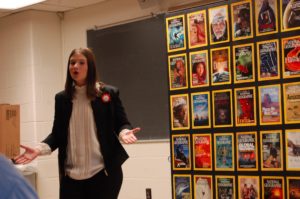 Creating a National History Day project takes A LOT of work. It may not be exactly “life consuming,” but I spent many hours on my performance to make it historically accurate, interesting and as sharp as possible. This past year, my performance was on the early history of the National Geographic Society and how it has changed the world as we know it. As a part of my research, I had the opportunity to speak to people involved with National Geographic, such as their archivist staff, and I was able to attend a lecture led by one of their photographers at the Perot Museum in Dallas. When my ATLAS 8th grade class visited the Washington D.C. in May, I was able to visit the actual archives deep inside the National Geographic Headquarters (I even ate lunch there; I recommend their chicken.) The very kind and patient archivists gave me a tour of the thousands of photographs held there, and told me about the history of their photography. The experience was a once in a lifetime, but the best part? Unexpectedly seeing CBS correspondent Mo Rocca in the lobby.
Creating a National History Day project takes A LOT of work. It may not be exactly “life consuming,” but I spent many hours on my performance to make it historically accurate, interesting and as sharp as possible. This past year, my performance was on the early history of the National Geographic Society and how it has changed the world as we know it. As a part of my research, I had the opportunity to speak to people involved with National Geographic, such as their archivist staff, and I was able to attend a lecture led by one of their photographers at the Perot Museum in Dallas. When my ATLAS 8th grade class visited the Washington D.C. in May, I was able to visit the actual archives deep inside the National Geographic Headquarters (I even ate lunch there; I recommend their chicken.) The very kind and patient archivists gave me a tour of the thousands of photographs held there, and told me about the history of their photography. The experience was a once in a lifetime, but the best part? Unexpectedly seeing CBS correspondent Mo Rocca in the lobby.
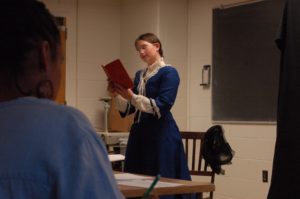 Spending a great amount of time on the computer polishing my research undoubtably made my project stronger, but the competition is by far the best part of history fair. Regional competition held at Baylor consists of performing in the early hours of dawn, then waiting all day for the results to be announced. State brings even more excitement and anxiety, where you have to perform in morning preliminary rounds, and hopefully again in the afternoon finals. Late afternoon brings the awards ceremony with hundreds of nervous teenagers in a confined space (yikes.) Many students go home empty handed, but the others are soon to embark on a very intense, yet very rewarding, journey to Nationals.
Spending a great amount of time on the computer polishing my research undoubtably made my project stronger, but the competition is by far the best part of history fair. Regional competition held at Baylor consists of performing in the early hours of dawn, then waiting all day for the results to be announced. State brings even more excitement and anxiety, where you have to perform in morning preliminary rounds, and hopefully again in the afternoon finals. Late afternoon brings the awards ceremony with hundreds of nervous teenagers in a confined space (yikes.) Many students go home empty handed, but the others are soon to embark on a very intense, yet very rewarding, journey to Nationals.
Competing at the National level (or even in State finals) is similar to being nominated for an Oscar. Whether you place or not, your project is already in the very top percentage of your competitors. I’ve seen countless projects compete at Texas History Day that are better than projects at the National level from other states. While it may be easy to get caught up in the lights of Nationals, it really is amazing to be surrounded by some of the best young historians in the world, let alone compete with them. Trading state buttons may be the most important social event of NHD, but growing closer with my classmates, competitors and fellow Texans is definitely one of my favorite parts of the experience (but buttons are pretty cool too.)  This year, I’ve competed with students from Guam, South Korea, Guatemala and more- people from countries I may never visit, all because of National History Day.
This year, I’ve competed with students from Guam, South Korea, Guatemala and more- people from countries I may never visit, all because of National History Day.
Don’t get me wrong, the competition is grueling and very nerve-racking. I’ve walked into my finals room before thinking, “What are my first words?” “Did I forgot a prop?” “I don’t have enough sources!” Yet, I’ve managed not to pass out at any competition yet. This year, I was very lucky to do well in my performance and to have judges that appreciated my work.
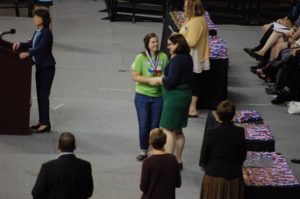 The awards ceremony at Nationals is possibly the most anxious three hours of the entire week. It consists of countless minutes of talking until your category is called. Then your stomach sinks to your feet, and it’s hard to remember you’re “having fun.” The feeling I was overwhelmed with when they called my name was one of shock, excitement and honestly just a lot of confusion. I sprinted down the stairs, whether to keep the ceremony moving or because I couldn’t stand to walk. I had done it!
The awards ceremony at Nationals is possibly the most anxious three hours of the entire week. It consists of countless minutes of talking until your category is called. Then your stomach sinks to your feet, and it’s hard to remember you’re “having fun.” The feeling I was overwhelmed with when they called my name was one of shock, excitement and honestly just a lot of confusion. I sprinted down the stairs, whether to keep the ceremony moving or because I couldn’t stand to walk. I had done it!
At the beginning of the last year, my social studies teacher, Mr. Wright, had us write down a goal for the year. I could have written “To pass the STAAR test” or “Make A Honor Roll”, but instead I wrote a goal I thought I couldn’t achieve – to win National History Day. As I share my experience with others or look back at this summer, all I am is thankful. Thankful that the dice rolled my way, thankful for my family and friends who pushed me to do the best I can. I’m thankful for my church and school family, my school district and teachers who give so much so that I can have an opportunity like this, and really thankful for a community that supports me in whatever I do. There isn’t a day that goes by that I regret doing history fair, no matter how stressful it might have been. And I’m thankful that I didn’t give up.
 Harper Hoover is currently a freshman at Waco High School where she stays busy with band, choir, school and community theater, and her 3 cats. This was her fourth year competing in the NHD contest, and her second time to make it to Nationals. She would like to thank the Waco Scottish Rite Foundation, the Heart of Texas Regional History Fair and Waco Independent School District for making her journey to Nationals possible.
Harper Hoover is currently a freshman at Waco High School where she stays busy with band, choir, school and community theater, and her 3 cats. This was her fourth year competing in the NHD contest, and her second time to make it to Nationals. She would like to thank the Waco Scottish Rite Foundation, the Heart of Texas Regional History Fair and Waco Independent School District for making her journey to Nationals possible.
The Act Locally Waco blog publishes posts with a connection to these aspirations for Waco. If you are interested in writing for the Act Locally Waco Blog, please email [email protected] for more information.
By Lizette LaStrape and Becky Boggus
The Support and Empowerment Program (SEP) at McLennan Community College provides a holistic support network to single parent students seeking a degree. To learn more information about the program and its purpose you can read a previous blog post written about SEP here: “Participants in MCC Program for Single Parents are hard-working, compassionate and driven!” Today we’d like to introduce you to one of our many exceptional students.
 Gabriela Segura, who is known by her SEP Coaches as Gaby, is a student in the Occupational Therapy Assistant (OTA) program. Gaby is also a single parent of a three-year-old child and the first and only member of her family to pursue college thus far. She is compassionate, intelligent, and unwavering in her desire to provide a better life for herself and her son.
Gabriela Segura, who is known by her SEP Coaches as Gaby, is a student in the Occupational Therapy Assistant (OTA) program. Gaby is also a single parent of a three-year-old child and the first and only member of her family to pursue college thus far. She is compassionate, intelligent, and unwavering in her desire to provide a better life for herself and her son.
Completing a health professions program at MCC is highly demanding of a student’s time and skills. It is not unusual for Gaby to start her morning with clinicals or studying before the sun comes up and finish the day reading class materials long after her son goes to bed. In between, she plays soccer, reads her son books, cooks dinner, attends classes and study groups, and tries to catch her breath! Being a single parent in the OTA program for Gaby is “way more difficult than I thought. It takes a lot of my time.” Between having a full course load, clinical rotations and being a single parent, Gaby says that “finding the time to study and spend time with my son; just balancing everything” has been the toughest part of being a single parent student for her.
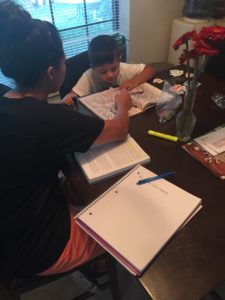 Still, through the late nights, the tests, skills assessments, and countless hours of studying she has persevered and will graduate in December 2016. A mere four months of classes, clinicals and sacrificing time away from her child remain before Gaby walks across the stage at commencement. She shared what graduation means to her – “It just means success! Success for me and him (her son), and my family overall. It will mean that I have accomplished the things that I set out to. I didn’t give up. I can accomplish anything and my son and siblings can too.”
Still, through the late nights, the tests, skills assessments, and countless hours of studying she has persevered and will graduate in December 2016. A mere four months of classes, clinicals and sacrificing time away from her child remain before Gaby walks across the stage at commencement. She shared what graduation means to her – “It just means success! Success for me and him (her son), and my family overall. It will mean that I have accomplished the things that I set out to. I didn’t give up. I can accomplish anything and my son and siblings can too.”
For first-generation students like Gaby, completing a college degree can mean changing the trajectory of their family for generations to come. Gaby states “going to college is something that I knew I had to do in order to live a different kind of life than my parents had.” Gaby shared that she didn’t receive messages about attending college from her family and states, “My mom never said, ‘Oh, you need to go to college.’ My messages came from school. That’s where I learned that education was the way to a better life. I saw how hard my mom had to work as a single parent. That’s not what I wanted. I wanted to have a job that I chose and that I enjoyed going to every day.”
In a world where first generation students are already overwhelmed with navigating the college system, add the additional responsibility of providing for a family, the lack of reliable childcare, transportation, financial resources and family support, and making it through college becomes a daunting goal. For these reasons, creating solid connections early in the college experience can make all the difference. MCC aims to provide just this type of connection for single parents and displaced homemaker students on campus through the SEP.
During her first semester of the OTA program, Gaby applied to SEP for the financial support, which the program provides in the form of childcare or transportation assistance to qualifying students. After being a part of SEP for several semesters, Gaby states, “This isn’t just help with daycare. I’ve gotten more out of this than I initially ever thought.” Gaby added, “My coach really is supportive and I like this program because the coaches are here to help with whatever you need. It’s a matter of just showing up and just asking.” In addition to financial support, SEP provides various skills-building workshops and one-on-one monthly support meetings with each student. Gaby stated, “They help with any resources that you need, and workshops are enjoyable and provide helpful information. I’ve learned how to be a better parent, how to communicate better and provide better nutrition for my son.”
While the decision to go to college was intimidating and her time as an OTA student has been challenging, Gaby shares that she has grown a lot personally through the experience – “I have proven to myself and others that I am smart. That I know more than I like to give myself credit for. That I am capable. That it’s not about the A’s, it’s about learning and understanding the material. That I am going to love what I do every day, because I already love it more, the more that I learn about it!”
To other single parents who are in college or thinking about attending college, Gaby has this to say: “If God has given you the opportunity, then just take it! God places everyone where they are for a purpose. Just never give up. Nothing is easy. The outcome is your reward.” In regard to being part of SEP, Gaby encourages other single parents by saying, “If you’re a single parent and completing a degree, you are working harder than most people. You have more responsibilities, and if you can have a program like SEP to help you get through this every day, then you can finish school!”
Every semester, SEP accepts new students with life stories similar to Gaby’s. SEP Coaches are ready and looking forward to each opportunity to take this journey of hard work and dedication with each single parent who dreams of earning a college education. SEP coaches are here to remind each potential student that, like Gaby, they are smart, capable and able of completing a college degree!
To learn more about the Support and Empowerment Program at MCC, call Lizette LaStrape at 299-8600 or Becky Boggus at 299-8569. To learn more about the Success Coach Program at MCC, call 299-UCAN (8226).
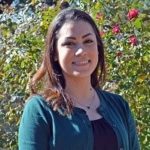 Lizette LaStrape is a native Californian, now living in Waco since 2006. She has worked at McLennan Community College for the last eight years and is passionate about higher education and helping people reach their goals. She loves spending family time with her husband and two-year-old daughter.
Lizette LaStrape is a native Californian, now living in Waco since 2006. She has worked at McLennan Community College for the last eight years and is passionate about higher education and helping people reach their goals. She loves spending family time with her husband and two-year-old daughter.
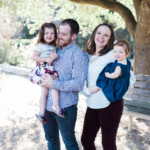 Becky Boggus is a Social Worker, a pastor’s wife, a mom, and a believer in education and strengthening Waco families. You can probably find her anywhere outside this summer: hiking in Cameron Park, chasing her kids around, and most likely eating a popsicle.
Becky Boggus is a Social Worker, a pastor’s wife, a mom, and a believer in education and strengthening Waco families. You can probably find her anywhere outside this summer: hiking in Cameron Park, chasing her kids around, and most likely eating a popsicle.
The Act Locally Waco blog publishes posts with a connection to these aspirations for Waco. If you are interested in writing for the Act Locally Waco Blog, please email [email protected] for more information.
By Jerrod Clark
Although the U.S. has only 5% of the World’s population, it has an astounding 22% of the world’s incarcerated population.[1] One out of three people in The U.S. have a criminal record.[2] 12 million Texans – nearly 45% of us – have a criminal record.[3] 4.7 million Texans have a conviction on their record.[4]
These criminal records severely restrict the chance to work and find housing. Employers and landlords can lawfully discriminate against those with convictions simply by asking applicants to “check the box” if they have a criminal record. And even if an individual doesn’t check the box, criminal background checks are at the fingertips of most employers and landlords via the convenient access through the internet.
In regard to hiring, these rules may seem reasonable at first glance, but the result is to exclude a massive pool of able-bodied individuals from being productive members of society. This creates further separation and segregation and ultimately increases crime.[5] If one cannot provide for him/herself with food and shelter, crime will be inevitable. This is a direct relationship that cannot be ignored any longer!
If one has been marked with a criminal record, the domino effect of systemic separation begins. We know that 50% of marriages end, most often due to financial stressors.[6] If one cannot get a job, the institution of marriage is at a higher risk for failure, and families are severed because of lack of income. Child Support fines, fees and interest mount and compound. Without income, a father then must go to jail if he cannot pay his financial obligations. Eventually his driver’s license will be revoked, often a final blow to one’s ability to access the few jobs that are available to felons.
Finding a place to live is another serious challenge for formerly incarcerated individuals. After an individual’s time has been served, he is released back into society to reintegrate. A foundational part of reintegration is to find a place to live. Landlords, however are legally allowed to discriminate on the basis of criminal record. Even if a formerly incarcerated person finds a landlord who is willing to rent to him, the cost is often prohibitive. Most landlords have a “3 times rule”—an applicant must have three times the rent in income to qualify and be eligible to be a potential applicant. This is a high bar for formerly incarcerated people who often struggle to get even a minimum wage job. These barriers often result in homelessness, which can have a negative effect on mental and physical health, making it even more difficult to find a job and a place to live. In other words, “the system” as it stands right now creates burdens on our community rather than alleviating them.
What can we do to change the system? I am not suggesting entitlement programs as a solution, I am suggesting equitable “in roads” and “on-ramps” or opportunities that allow one to get back on track and recover and develop from their past and present circumstance.
Here are three concrete possibilities:
- Encourage private businesses to adopt “Fair Chance Hiring Policies.” These policies do not require that employers ignore a job candidate’s past, but they do delay questions about criminal background until after the individual has had a chance to present his or her qualifications and make a case for being considered. Many employers have found that formerly incarcerated individuals make excellent employees if given the chance.
- Support bills like SB 1473which limits liability for landlords who rent to those with criminal records. SB 1473 is currently awaiting review under the Senate State Affairs Committee. Research show that crime, recidivism and homelessness decrease and production increases when housing options are increased for formerly incarcerated individuals.[7]
- Landlords could also work together to allow the working poor (including the formerly incarcerated) fair access to affordable housing. Instead of the “three times rule,” they could institute a “two times rule” for individuals who have been vetted by agencies like Mission Waco and Salvation Army. Waco landlords, please entrust organizations like these to be the “middle man” or advocate that can stand with and behind the individuals who need such a break just as Jesus stands with us.
As an educated white male with a livable wage job, my own experiences cannot fully equip me to represent the experiences of marginalized populations. However, because of my vocation and more than a decade of working with the “disqualified”– those “locked up and locked out” of society — I feel “qualified” to advocate with and on behalf of those affected by systems of oppression.
What qualifies me even more than that is what Christ did by taking my place on the Cross, making me a kid of the King and giving me citizenship to the Kingdom of God. This makes me doubly responsible to speak for those who cannot speak for themselves. I cannot be silent. I must not be afraid to speak up and speak out.
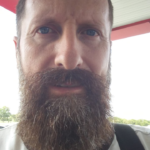 Jerrod Clark is a Texas transplant. He came to Waco in 1996 to attend school and never left. He is a graduate of Baylor University’s Diana R. Garland School of Social Work and is the Social Worker at the Meyer Center for Urban Ministries. He has been working with the homeless since 1998. He and his wife, Carolina of seven years have two daughters, Nichole and Hannah Jean. They are active participants at Church Under the Bridge.
Jerrod Clark is a Texas transplant. He came to Waco in 1996 to attend school and never left. He is a graduate of Baylor University’s Diana R. Garland School of Social Work and is the Social Worker at the Meyer Center for Urban Ministries. He has been working with the homeless since 1998. He and his wife, Carolina of seven years have two daughters, Nichole and Hannah Jean. They are active participants at Church Under the Bridge.
The Act Locally Waco blog publishes posts with a connection to these aspirations for Waco. If you are interested in writing for the Act Locally Waco Blog, please email [email protected] for more information.
Notes:
[1] http://www.prisonstudies.org/news/more-102-million-prisoners-world-new-icps-report-shows
[2] http://www.sentencingproject.org/wp-content/uploads/2015/11/Americans-with-Criminal-Records-Poverty-and-Opportunity-Profile.pdf
[3] https://www.ncjrs.gov/pdffiles1/bjs/grants/244563.pdf
[4] http://www.texaspolicy.com/library/doclib/2007-11-PP28-licensing-ml.pdf
[5] http://publicpolicycenter.texascjc.org/wp-content/uploads/2014/12/TCJC-Fact-Sheet-SB-1473-Landlord-Protection.pdf
[6] http://www.apa.org/topics/divorce/
[7] http://publicpolicycenter.texascjc.org/wp-content/uploads/2014/12/TCJC-Fact-Sheet-SB-1473-Landlord-Protection.pdf
(Act Locally Waco loves Waco area entrepreneurs! For more posts about local entrepreneurs, please click here: Entrepreneurs of Waco. – ABT)
By Kathy Carr
“It makes me laugh thinking how a guy who grew up in the suburbs of Dallas now owns a farm… but I love what I do.” – -Gib Reynolds
Salads have become the epitome of healthy eating these days. There’s nothing quite like digging into a big bowl of veggie-filled goodness. Toss in some grilled chicken and even the carnivorous can reap the health benefits of the bountiful greens.
But with recalls becoming more prevalent, there’s an understandable lack of trust in the safety of supermarket produce. Wouldn’t it be nice if there was a way for farmers to safely grow leafy greens without harmful pesticides and exposure to all of the unhealthy yucks that make people sick?
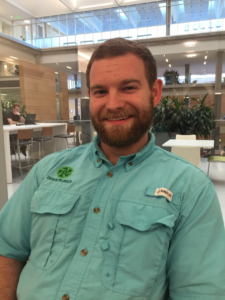 Gib Reynolds and his dad have done just that with Urban Produce. Together, this father-son duo have founded a large scale hydroponic lettuce farm where everything is controlled and grown indoors. The greens are grown “under glass” on floating rafts in nutrient rich ponds. This method provides a pesticide-free environment, and also eliminates the possibility of toxins and other environmental junk from making their way to the growing greens.
Gib Reynolds and his dad have done just that with Urban Produce. Together, this father-son duo have founded a large scale hydroponic lettuce farm where everything is controlled and grown indoors. The greens are grown “under glass” on floating rafts in nutrient rich ponds. This method provides a pesticide-free environment, and also eliminates the possibility of toxins and other environmental junk from making their way to the growing greens.
It’s quite an innovative idea. The funny part is that Gib grew up a city-boy in Richardson, Texas. He’s an Eagle Scout who flew model rockets competitively all around Eastern Europe. When Gib came to Baylor in 2008, he did study Entrepreneurship as an undergrad, but farming wasn’t his end goal.
Gib was interested in developing a portal that could connect investors and entrepreneurs, something similar to the Baylor Angel Network (BAN) where investors provide early-stage capital to entrepreneurs with business plans. Gib was highly involved in BAN as an undergrad and even became an analyst, so this seemed like a perfect fit.
After his Baylor undergraduate work, Gib continued his studies in the MBA program at Acton. He tossed around a couple of business ideas, but as he researched controlled environment agriculture and food production Gib realized there was a unique opportunity. And the idea for Urban Produce became a reality.
Gib’s long-term goal with Urban Produce was to build a huge lettuce company. Go big or go home is an underlying motto for all entrepreneurs, but with ninety-eight percent of lettuce in the US coming from California building a dominating lettuce company is a daunting mission. But with his self-proclaimed stubborn nature, Gib dug in his heels for the long haul.
Before any produce could even be sold, it was imperative for Urban Produce to receive certification for GAP/GMP (Good Agriculture Practices and Good Manufacturing Practices). The certification provided a layer of accountability to help customers trust this new startup company.
One of the initial challenges Urban Produce faced was finding those trusting customers and ensuring that distribution processes were in place to get the greens to customers in a timely fashion. Careful not to bite off too much too quickly, father and son built a loyal customer base one customer at a time. Confident in their product, the duo simply lets the lettuce do the talking. And the lettuce has been talking…a lot. So much so, that Urban Produce has expanded distribution beyond the confines of the Waco area. With regular deliveries to San Antonio and Houston, this lettuce is outright screaming.
Urban Produce trudges through the normal layers of regulations and inspections that come with being a food producer. Inspections and annual audits from the USDA help ensure proper growing and handling techniques. Gib feels that food safety is a paramount concern, so while the regulations may be at times be an annoyance, it’s all necessary in order to keep food safety on the front burner.
All-in-all, the proof is in the pudding… or maybe it’s better said, the proof is in the lettuce. No herbicides – no insecticides – no pesticides, but loads of tasty deliciousness. Gib’s hopes of putting Waco on the map as the “Lettuce Capital of Texas” may not be too far off.
 Kathy Carr is a long-time Wacoan. She’s a Baylor grad who just couldn’t’ get enough of the university so she now works there too. She loves the beach, a bowl of good ice cream and Netflix binges.
Kathy Carr is a long-time Wacoan. She’s a Baylor grad who just couldn’t’ get enough of the university so she now works there too. She loves the beach, a bowl of good ice cream and Netflix binges.
The Act Locally Waco blog publishes posts with a connection to these aspirations for Waco. If you are interested in writing for the Act Locally Waco Blog, please email [email protected] for more information.
